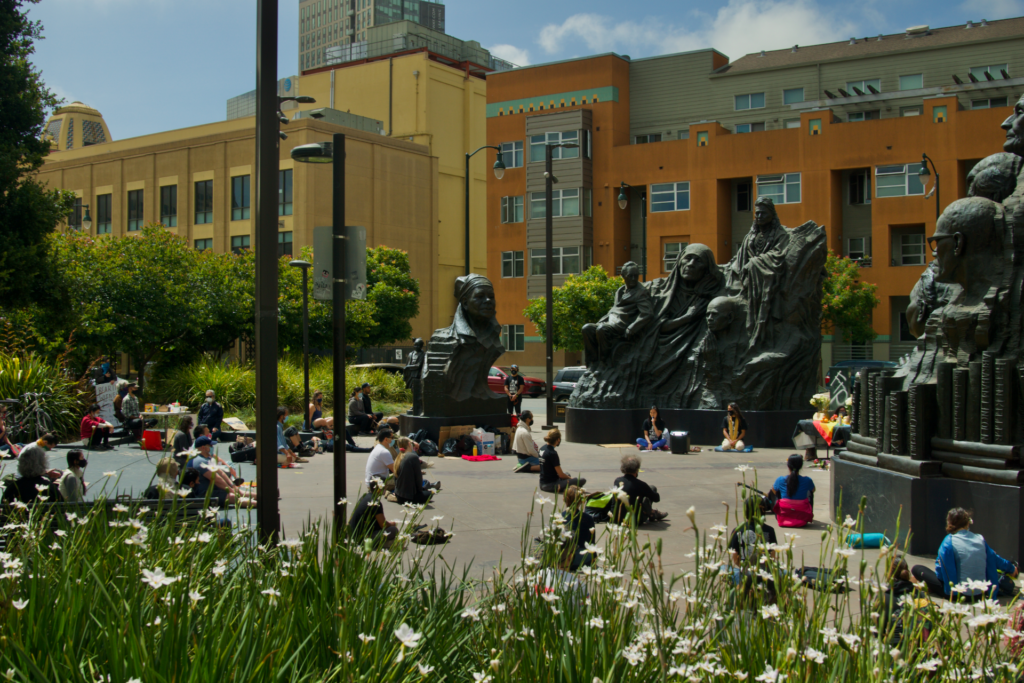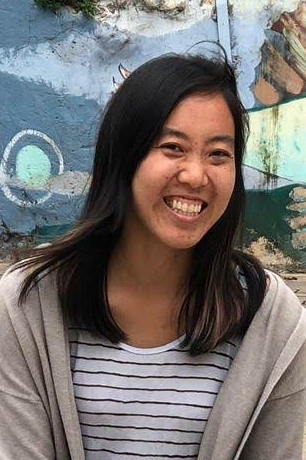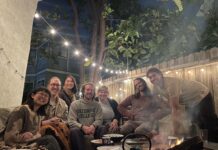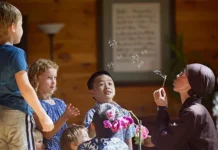by Melanie Gin

In Israel and Palestine, where I lived from December 2018 to March 2020, a vast concrete wall separates Jerusalem from the West Bank. The wall is impassable for many: It is illegal for Israelis to cross into the West Bank, and it’s difficult for Palestinians to receive permits to enter Israel. Israeli military checkpoints are the only point of entry and exit between the two sides.
As an American on a work visa, I had the privilege of mobility, crossing the border on an almost daily basis. In Jerusalem, Israel, I lived for a time in the lively neighborhood of Nachlaot with three expat roommates from a Jewish Zionist-Socialist youth movement. In our spare time we hosted leftist gatherings, shopped at the local marketplace, did yoga, and binge-watched Netflix.
In Bethlehem, Palestine, I worked at an American school not far from the Nativity Church, the birthplace of Jesus Christ. I spent Saturday afternoons at a bustling café before facilitating an after-school computer science program for twenty Palestinian young people. In between technical lectures and problem sets, I learned about my students. They were Muslim and Christian, coming from both the poverty of refugee camps and from some of the wealthiest Palestinian families. They spoke English, Arabic, and some Hebrew. Some were American citizens.
These were two different worlds separated by five kilometers and the towering separation wall, accessible only to internationals, Israelis willing to skirt the rules, and Palestinians with permits. I would cross the border via Arab bus 231, paying ten shekels (three dollars) for the forty-five-minute ride. The bus would weave through Jerusalem and cross the checkpoint without hindrance on the way into Palestine, but on the way back it was a different story.
On each entry into Israel, the bus would stop at the military checkpoint. The Palestinian riders would shuffle outside. The internationals and elderly riders would stay on board, and the Israeli soldiers would enter two at a time, one the “lead” and the other as back-up. The “lead” soldier would walk briskly down the aisle, stopping at each rider for a document check. Most times, the soldiers barely glanced at my American passport or said something friendly in English. Other times, the soldiers asked questions about my visit in Palestine.
Once, the soldiers decided to interrogate me: they took my passport, scrutinized my visa, and told me I couldn’t be “on this side” as an American. I could not argue, even though I had passed this way almost daily for months, even though as an American, I did not need a visa for traveling to the West Bank (I had one anyway). I could not argue with a soldier who had the power to refuse me entry into Israel, and definitely not with a person under severe stress, carrying a machine gun. This incident and many like it throughout my time in Israel and Palestine created a strong narrative in my mind, one that fed the flames of anger and fear whenever I saw soldiers or thought about Palestine under military occupation.
I was fortunate to have good friends on both sides of the political border, friends in whose company and love I could take refuge on the darkest of days. The all-ages Sangha in Jerusalem was one of these groups. In sitting meditation and Dharma sharing at Balfour 8, I bore witness to the compassion and humanity of my Israeli friends, separate from any label of nationality. These evenings with my friends in the Jerusalem Sangha touched my heart and saved me from hatred. When I could see my friends as humans I loved, my anger and hatred could dissolve, leaving only trembling sadness at the existence of suffering—be it Palestinian, Israeli, or American. In this foreign land, the intimacy of seeing “the other” allowed my heart to break open in love again and again.
Now I have returned home to family near San Francisco, California, in the United States, on land that was once home to Ohlone and Bay Miwok tribes, later Spanish settlers, and now this gathering of Americans. I am here as a non-Black person of color, a Japanese-Chinese American with light-skin privilege. Here I do not fear the police as I did the Israeli soldiers abroad. I do not fear them invading my home, assaulting my brothers, or suffocating me on the street.
Here, in this time of racial and social injustice becoming increasingly visible, I see again the truth of intimacy: I cannot hate “the other” if I see the suffering in their heart. I cannot hate the police officer and I cannot hate the Black or brown body. Each person is suffering from the unspoken trauma of racial oppression: the Black body, the white body, the police body, this “sunflower yellow” body of mine.
I remember that “the other” is not always the enemy on the other side of an uncrossable border. The other is anyone or any piece within me that I perceive as separate from myself. I must learn to embrace the parts of me that I turn away from in anger or fear, the parts I wish would disappear. Just as I learn to see and embrace those with different opinions, skin colors, and nationalities.
In Israel, I found sacred space to embrace the other on Wednesday evenings at Balfour 8, meditating with a group of Israeli friends. Now, in the San Francisco Bay Area, I have found this space on the streets of San Francisco and Oakland, sitting in peaceful protest with friends, neighbors, and strangers in support of the Black Lives Matter movement. We have come together to grieve the Black lives lost to police violence and to cultivate stillness in our own bodies, to figure out our roles in resisting op- pression and violence. We have come together to see each other in our fullness and to understand more deeply the suffering of those in our communities. We call our events “Sit. Walk. Listen.” Each event consists of two hours of meditation, movement, and deep listening.
I understand more deeply when I hear from the father, afraid for the lives of his Black sons; when I listen to the son of the law enforcement officer, whose father joined the police force to keep his community safe from harm; when I see on the girl’s face the optimism she feels, coupled with the worry that this too will dis- appear from public consciousness. In these public gatherings, the truth of the other transforms me. The walls in my heart crumble, soothing my anger and fear, inviting into their place compassion and tenderness.
Today, I write as one of two lead organizers of these peaceful protests, and as a human being mourning the separation within each of us that manifests in oppression and hatred. Since the death of George Floyd in May 2020, friends from Wake Up San Francisco and I have organized seven of these protests across the San Francisco Bay Area, bringing the energy of mindfulness to the anti-Black racial oppression pervasive in American society. These protests have brought together people of all backgrounds, colors, and ages to be together in silence, to walk as one com- munity, and to be present for each other. To crumble the walls of separation in our hearts.
It’s now September. Four months have passed since our first protest. I am committed to continue these protests, letting their form shift as is necessary, as the pandemic, wildfires, and continued racial and social inequities present the need for new spaces of healing. I am committed to acting out of love for social change and to keeping my heart open to others, even when it’s difficult—especially when it’s difficult. I know that opening my heart is an act of transforming my suffering into love, and that this love has the power to transform the world.
When I see the other clearly, the illusion of separation dissolves. My anger becomes the fire driving my call to justice. My tears become the rain, nourishing my commitment to peace, healing, and collective awakening.
Dear reader, I end this essay with a poem for you:
And so I say to you, the stranger I do not yet know: Let us continue to meet in this sacred space of protest, crumbling the walls of separation keeping us from seeing the clear intertwining of our roots, the gentle song you sing carried by the wind to the garden in which I tend my red maple tree. Your voice is arising as the purest sound of love.

Melanie Gin, Peaceful Embracing of the Heart, is an innovator and social changemaker trained in mindfulness, resiliency building, and engineering. They are a founder of Makeen Initiative, a grassroots organization that makes tech education accessible to young Palestinians. They are also one of the lead co-organizers of Sit. Walk. Listen., held in solidarity with Black Lives Matter. Melanie lives in Ukiah, California, US, and practices with the Sugarplum and Wake Up San Francisco Sanghas.
Reprinted with permission from the Mindfulness Bell. To read more articles in the current Winter/Spring issue, you can purchase a single issue or a subscription here.
















